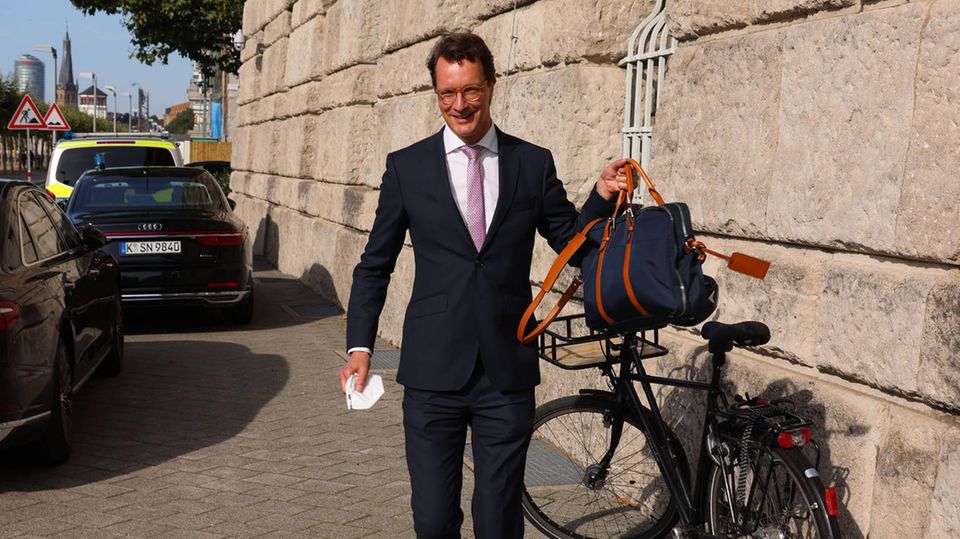Many politicians claim how important environmental protection is to them – but they harm the climate with dirty vehicles. Very few of them really mean it, a study shows.
Private jets and company cars should stay in the garage. Before taking office, Annalena Baerbock promised that she would travel more by train and, if necessary, by scheduled flights. A lie or naive? We don’t know. The only thing that is certain today is that Germany’s Green Foreign Minister did not stick to her promise. In her first year in office alone, she jetted around Germany and abroad at least a hundred times. She traveled four times by scheduled flight and twice by train, citing the Foreign Office.

This is likely to make Baerbock grit her teeth. Others are more relaxed. For example, Friedrich Merz, who flew to Christian Lindner’s wedding in Sylt in a private plane. Or former Defense Minister Christine Lambrecht, who got into a helicopter for a short visit to the troops in northern Germany, with her son in tow. For politicians from the Berlin Senate, such trips in official cars have long been common practice: since 2022, they have been allowed to drive their .
Company cars beat environmental and climate protection – this is also shown by a (DUH). The organization compiled a ranking of the CO2 emissions of the vehicles of 252 politicians across Germany. If a politician has several company cars, only the most environmentally harmful vehicle was taken into account.
Sobering result: The majority fail the DUH test. After the diesel emissions scandal, the EU has introduced a new DUH test. Passenger cars are only allowed to emit 95 grams per kilometer. But almost three quarters of company cars exceed the European fleet limit, meaning they emit significantly more CO2 than an average car registered in Germany should.
Hardly any electric, lots of combustion engines and even more plug-ins
73 respondents are driven in a combustion engine. The vehicles with the most harmful impact on the climate are in the garages of NRW Prime Minister Hendrik Wüst (CDU), NRW Interior Minister Herbert Reul (CDU) and Berlin’s Interior Senator Iris Spranger (SPD). So far, only six politicians are relying on purely electric cars, including Environment Minister Steffi Lemke (Greens), Agriculture Minister Cem Özdemir (Greens) and Hamburg’s First Mayor Peter Tschentscher (SPD).
According to the DUH analysis, the most popular are plug-in hybrids; cars with combustion engines and batteries. The automotive industry praises them as a compromise because they can be used electrically for short journeys in cities and therefore do not harm the urban climate. At the same time, thanks to the combustion engine, they can also comfortably cover long distances.
Critics see them as an ecological scam. Unlike with electric vehicles, owners are not forced to charge the vehicles regularly. If the battery is empty or there is no charging station nearby, driving is less environmentally friendly. Studies show that plug-in hybrids are mainly used in combustion mode. Depending on the engine and driving behavior, the cars emit more CO2 than pure diesel or gasoline vehicles, according to an analysis by the ADAC. For the DUH study, the authors assumed the worst-case scenario, i.e. that they are used in combustion mode. However, it is uncertain whether top politicians actually drive like this.

Although the study paints a clear picture, the statistics are not entirely meaningful. For example, the vehicles of particularly vulnerable politicians such as Chancellor Olaf Scholz, Economics Minister Robert Habeck, Finance Minister Christian Lindner or Annalena Baerbock were not included in the study’s calculations. Nor was it examined how often the politicians use their vehicles and how far they drive them. Air travel, which is far more harmful to the climate, was also not taken into account.
Two environmentally friendly country leaders
Nationwide, not a single state government is able to comply with European emissions standards. In some places, the levels are more than twice as high.
The situation is similar for the state leaders themselves. Hamburg’s First Mayor Peter Tschentscher (SPD) and Baden-Württemberg’s Prime Minister Winfried Kretschmer are the only ones who, according to the study, adhere to the European guidelines. Bremen’s Mayor Andreas Bovenschulte (SPD) ranks third. However, his company car already emits 167 grams of CO2 per kilometer. Hendrick Wüst (CDU) manages more than twice as much with his company car: 380 grams per kilometer.
Rare, but also present: politicians with a company bike. The German Environmental Aid lists three, including the Bremen Environment Minister and two officials from Habeck’s Ministry of Economic Affairs and Climate. According to the ranking, Hamburg’s Transport Minister has neither a company car nor a company bike. He therefore always gets around on foot or by public transport.

So there are real environmental friends in the political landscape after all – and thus enough role models for colleagues who also like to use company cars and the like for private purposes.
Source: Stern
I have been working in the news industry for over 6 years, first as a reporter and now as an editor. I have covered politics extensively, and my work has appeared in major newspapers and online news outlets around the world. In addition to my writing, I also contribute regularly to 24 Hours World.




